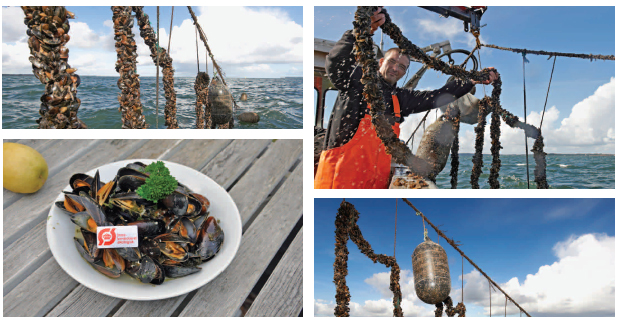Boom in production of organic line mussels in denmark
Organic farming of line mussels makes a significant footprint in the development of the Danish Aquaculture sector, targeting 10 percent of the production being organic by 2018.

Currently nine production units have been approved for a total production of some 3,500 t/yr. Danish production of line mussels takes place in the Limfjorden (North West Jutland), where the main producer currently is Seafood Limfjord in cooperation with the mussel processing company Vildsund Blue in Nykøbing Mors. Mussels are farmed on lines and in big socks and, because they are reared closer to the surface than wild mussels, more algae and other seston is available to support growth. Naturally occurring mussel spat settle on the lines each year and harvesting is done by boat. Mussels contribute to the removal of nitrogen and phosphorus from water.
In addition to fulfilling the requirements for the conventional production of line mussels, organic line mussels must fulfill several further requirements related to environment, resource consumption, food security and animal welfare.
Organic production of line mussels must be approved by governmental authorities, which issue an organic report containing an “organic self-regulation program” and a “plan for sustainable management,” which includes impacts of production on the environment, annual removal of nutrients (N and P) and applied energy sources (if possible, renewable energy).
Further, organic production of line mussels is characterized by:
• Required distance between the production unit and possible sources of pollution
• Prohibition to apply hormones and GMO in the production
• Consideration of protected species (e.g. birds, porpoise, otter)
• Focus on prevention of diseases
• Maintenance of an extended log-book to secure traceability of production
• Prohibition of antifoulant use on boats and production units
• Priority of using easily-degradable materials
• No use of antibiotics or chemicals in production
• Only use of approved organic substances in connection to processing on land
The positive development in the production of organic line mussels has been facilitated by various initiatives from the Danish aquaculture sector. This includes contribution to the establishment and development of a sustainable market for organic line mussels, in cooperation with organic line mussel producers and the processing industry and supported by governmental funds. Further knowledge about organic line mussels has been extended to the entire value and distribution chain at national and international levels.
This article is published in the September 2015 issue of World Aquaculture, vol 46, no. 3, www.was.org